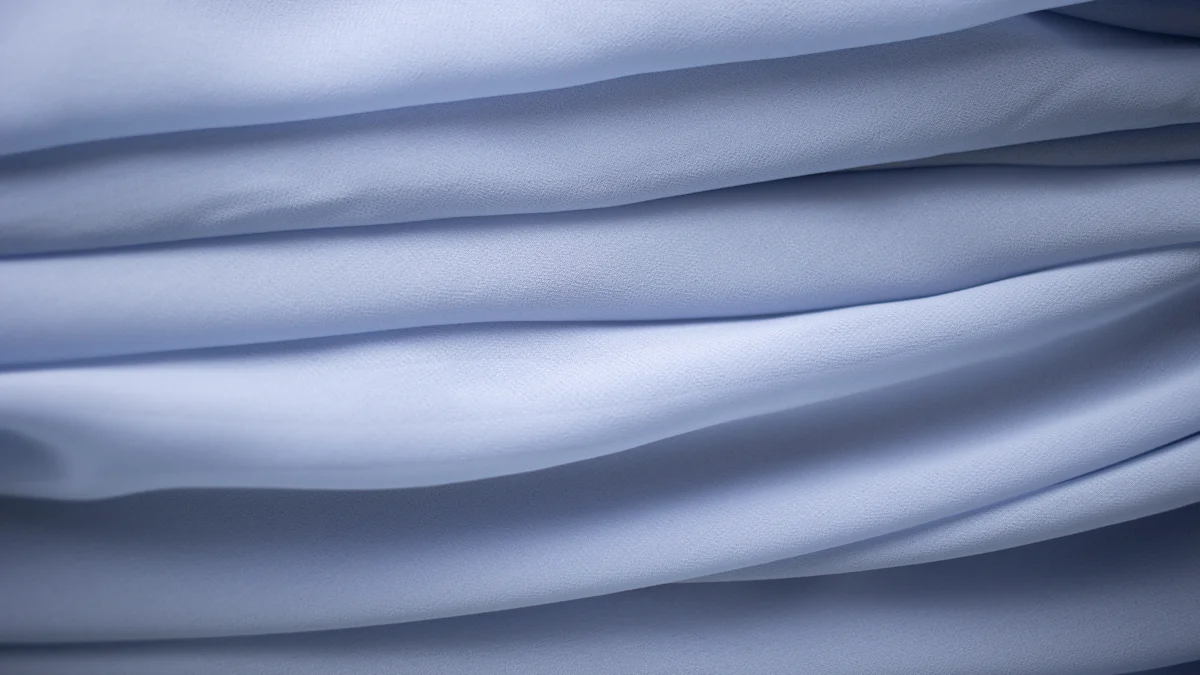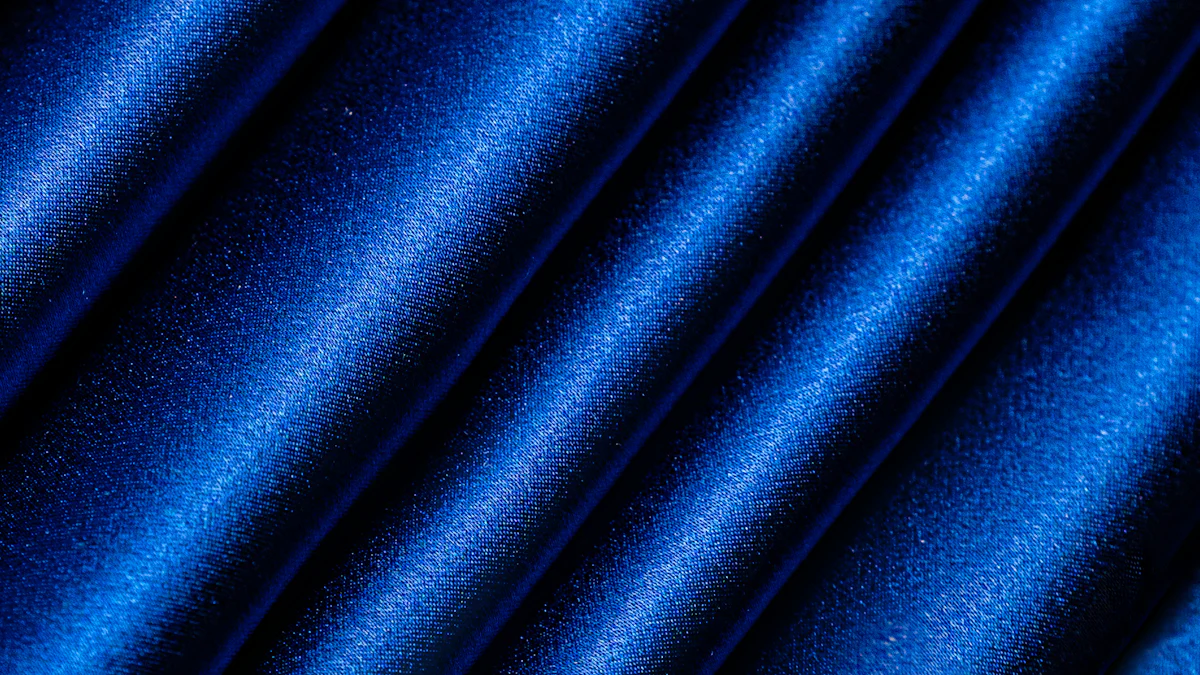The impact of OEKO certificate on the procurement of polyester viscose fabric

I have noticed that the OEKO certificate significantly influences the procurement of polyester viscose fabric. This certification ensures that the fabric is free from harmful substances, making it a preferred choice for many in the industry. Certification plays a crucial role in sustainable procurement practices. It assures buyers of the fabric's safety and environmental compliance. Industry professionals and stakeholders find this certification invaluable. It enhances trust and credibility in the supply chain. The demand for certified polyester viscose fabric continues to grow as sustainability becomes a priority.
Key Takeaways
- The OEKO certificate ensures polyester viscose fabric is free from harmful substances, promoting safety for both manufacturers and consumers.
- Sustainability is a core focus of the OEKO certification, encouraging manufacturers to adopt eco-friendly production practices that reduce environmental impact.
- Procurement decisions increasingly favor OEKO-certified fabrics, as they align with global safety standards and enhance market competitiveness.
- Investing in OEKO-certified polyester viscose fabric may involve higher initial costs, but the long-term benefits include superior quality and reduced risks associated with non-compliance.
- Consumer demand for OEKO-certified products is rising, reflecting a shift towards prioritizing safety and sustainability in textile choices.
- Brands that offer OEKO-certified fabrics build stronger reputations and consumer trust, leading to increased loyalty and repeat purchases.
- Selecting OEKO-certified suppliers is crucial for ensuring compliance with safety and environmental standards, supporting sustainable procurement practices.
Understanding the OEKO Certificate
Definition and Purpose
I have come to understand that the OEKO certificate serves as a critical benchmark in the textile industry. This certification ensures that textiles, including polyester viscose fabric, meet stringent safety and environmental standards. The OEKO-TEX Standard 100, a globally recognized certification, tests for harmful substances. It guarantees that certified products are free from chemicals that could pose health risks. This assurance is vital for manufacturers and consumers alike, as it promotes trust and safety in textile products.
The purpose of the OEKO certificate extends beyond safety. It also emphasizes sustainability. By adhering to the OEKO-TEX guidelines, manufacturers commit to eco-friendly production practices. This commitment reduces the environmental impact of textile manufacturing. I see this as a significant step towards achieving a more sustainable industry. The certification process involves rigorous testing and evaluation, ensuring that only compliant products receive the OEKO label. This thorough approach enhances the credibility of certified fabrics in the market.
Relevance to Polyester Viscose Fabric Procurement
In my experience, the OEKO certificate plays a pivotal role in the procurement of polyester viscose fabric. Buyers prioritize certified fabrics because they align with global safety and environmental standards. This alignment is crucial for companies aiming to meet regulatory requirements and consumer expectations. The certification provides a competitive edge in the market, as it assures buyers of the fabric's quality and safety.
Procurement decisions often hinge on the availability of OEKO-certified polyester viscose fabric. Companies seek suppliers who can provide certified materials to ensure compliance with international standards. This demand influences the supply chain, encouraging more manufacturers to pursue certification. As a result, the availability of OEKO-certified polyester viscose fabric continues to grow, meeting the increasing demand for sustainable and safe textile products.
Environmental and Sustainability Benefits

Reduction of Harmful Substances in Polyester Viscose Fabric
I have observed that the OEKO certificate plays a crucial role in reducing harmful substances in polyester viscose fabric. This certification ensures that the fabric undergoes rigorous testing to meet stringent safety standards. By eliminating toxic chemicals, the OEKO certificate guarantees that the fabric is safe for both manufacturers and consumers. This reduction in harmful substances not only protects human health but also minimizes environmental pollution. I believe that this commitment to safety and sustainability makes OEKO-certified polyester viscose fabric a preferred choice in the textile industry.
Promotion of Eco-friendly Production Practices
In my experience, the OEKO certificate encourages manufacturers to adopt eco-friendly production practices. By adhering to the guidelines set by the certification, manufacturers commit to reducing their environmental footprint. This involves using sustainable raw materials, minimizing waste, and conserving energy during the production process. I see this as a significant step towards achieving a more sustainable textile industry. The promotion of eco-friendly practices not only benefits the environment but also enhances the reputation of manufacturers who prioritize sustainability. As a result, OEKO-certified polyester viscose fabric gains a competitive edge in the market, appealing to environmentally conscious consumers.
Influence on Procurement Decisions
Criteria for Selecting OEKO-Certified Suppliers
When I evaluate suppliers for polyester viscose fabric, I prioritize those with OEKO certification. This certification assures me that the fabric meets high safety and environmental standards. I look for suppliers who demonstrate a commitment to sustainability and transparency. They should provide documentation that verifies their compliance with OEKO-TEX guidelines. I also consider their track record in maintaining certification over time. Consistency in adhering to these standards indicates reliability and dedication to quality.
I find it essential to assess the supplier's production processes. They should employ eco-friendly practices and minimize the use of harmful substances. I often request samples to verify the quality and safety of the polyester viscose fabric. Additionally, I value suppliers who offer competitive pricing without compromising on the integrity of the certification. This balance between cost and quality is crucial in making informed procurement decisions.
Impact on Cost and Quality Considerations
In my experience, OEKO certification can influence both cost and quality considerations in the procurement of polyester viscose fabric. Certified fabrics often come at a premium due to the rigorous testing and compliance processes involved. However, I believe this investment is worthwhile. The assurance of safety and sustainability enhances the fabric's value. It also reduces potential risks associated with non-compliant materials.
I have noticed that OEKO-certified polyester viscose fabric tends to exhibit superior quality. The certification process ensures that the fabric is free from harmful chemicals, which can affect durability and performance. This quality assurance translates into longer-lasting products, reducing the need for frequent replacements. While the initial cost may be higher, the long-term benefits in terms of quality and consumer trust justify the investment. I find that prioritizing OEKO-certified suppliers ultimately supports sustainable procurement practices and aligns with industry trends towards eco-friendly textiles.
Consumer Preferences and Market Trends

Growing Demand for OEKO-Certified Polyester Viscose Fabric
I have observed a significant increase in consumer demand for OEKO-certified polyester viscose fabric. This trend reflects a broader shift towards sustainability and safety in textile choices. Consumers today prioritize products that guarantee safety from harmful substances. They seek assurance that their purchases align with eco-friendly practices. The OEKO certification provides this assurance, making it a key factor in purchasing decisions.
Retailers and manufacturers respond to this demand by offering more OEKO-certified options. They recognize the value consumers place on certified fabrics. This shift not only meets consumer expectations but also enhances product appeal. I see this as a positive development for the industry. It encourages sustainable practices and supports the growth of eco-conscious consumerism.
Influence on Brand Reputation and Consumer Trust
In my experience, OEKO certification significantly impacts brand reputation and consumer trust. Brands that offer OEKO-certified polyester viscose fabric often enjoy enhanced credibility. Consumers associate these brands with quality and responsibility. They trust that certified products meet high safety and environmental standards.
I have noticed that brands leveraging OEKO certification often experience increased customer loyalty. Consumers appreciate transparency and commitment to sustainability. They prefer brands that align with their values. This preference translates into repeat purchases and positive word-of-mouth. I believe that prioritizing OEKO-certified fabrics strengthens brand image and fosters long-term consumer relationships.
I have seen firsthand how the OEKO certificate profoundly impacts the procurement of polyester viscose fabric. This certification ensures that the fabric meets high safety and environmental standards, making it a preferred choice for many in the industry. By adopting OEKO-certified fabrics, we contribute to sustainability and promote eco-friendly practices. Businesses benefit from enhanced brand reputation and consumer trust, while consumers enjoy safer and more sustainable textile products. The OEKO certification not only supports compliance with global standards but also aligns with the growing demand for responsible and sustainable textile solutions.
FAQ
What is the OEKO certificate, and why is it important for polyester viscose fabric?
The OEKO certificate is a globally recognized certification that ensures textiles, including polyester viscose fabric, are free from harmful substances. It is crucial because it guarantees safety and environmental compliance, making the fabric a preferred choice for manufacturers and consumers who prioritize health and sustainability.
How does the OEKO certification process work for polyester viscose fabric?
The OEKO certification process involves rigorous testing of polyester viscose fabric to ensure it meets stringent safety and environmental standards. Laboratories test the fabric for harmful chemicals, ensuring it is safe for use. Only fabrics that pass these tests receive the OEKO label, signifying their compliance with high safety standards.
Can OEKO-certified polyester viscose fabric impact procurement costs?
Yes, OEKO-certified polyester viscose fabric can influence procurement costs. The certification process involves thorough testing, which may result in a premium price. However, this investment is worthwhile as it assures safety, quality, and sustainability, reducing potential risks associated with non-compliant materials.
Why do consumers prefer OEKO-certified polyester viscose fabric?
Consumers prefer OEKO-certified polyester viscose fabric because it guarantees safety from harmful substances and aligns with eco-friendly practices. This assurance meets the growing demand for sustainable and safe textile products, making it a key factor in purchasing decisions.
How does OEKO certification affect brand reputation?
OEKO certification enhances brand reputation by associating it with quality and responsibility. Brands offering OEKO-certified polyester viscose fabric enjoy increased consumer trust and loyalty, as customers appreciate transparency and commitment to sustainability.
What are the environmental benefits of using OEKO-certified polyester viscose fabric?
OEKO-certified polyester viscose fabric reduces harmful substances and promotes eco-friendly production practices. This commitment minimizes environmental pollution and supports sustainable industry practices, benefiting both the environment and the reputation of manufacturers.
How does OEKO certification influence supplier selection?
When selecting suppliers for polyester viscose fabric, I prioritize those with OEKO certification. This certification assures me of the fabric's safety and environmental compliance. I look for suppliers who demonstrate a commitment to sustainability and provide documentation verifying their adherence to OEKO-TEX guidelines.
Is there a growing market demand for OEKO-certified polyester viscose fabric?
Yes, there is a significant increase in market demand for OEKO-certified polyester viscose fabric. This trend reflects a broader shift towards sustainability and safety in textile choices, with consumers prioritizing products that guarantee safety and align with eco-friendly practices.
How does OEKO certification contribute to sustainable procurement practices?
OEKO certification supports sustainable procurement practices by ensuring that polyester viscose fabric meets high safety and environmental standards. By prioritizing certified fabrics, businesses contribute to sustainability and promote eco-friendly practices, aligning with industry trends towards responsible textile solutions.
What role does OEKO certification play in international markets?
In international markets, OEKO certification serves as a valuable asset for suppliers of polyester viscose fabric. It ensures compliance with global safety and environmental standards, enhancing marketability and providing a competitive edge in meeting regulatory requirements and consumer expectations.
Post time: Dec-13-2024

